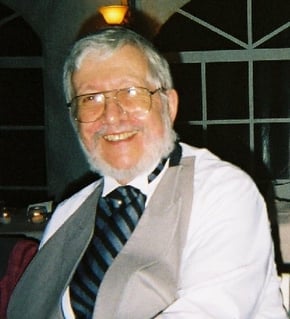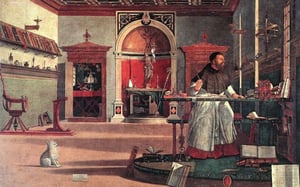“It is also necessary—may God grant it!—that in providing others with books to read I myself should make progress, and that in trying to answer their questions I myself should find what I am seeking. Therefore at the command of God our Lord and with his help, I have undertaken not so much to discourse with authority on matters known to me as to know them better by discoursing devoutly of them.” -St. Augustine of Hippo, “The Trinity” I, 8
As a science and math geek (1) I need a patron saint. After an internet search, I found the patron of science to be St. Albert the Great (Albertus Magnus) and the patron saint of mathematics to be St. Hubert. Puzzlement! I don’t know what St. Hubert had to do with math—perhaps, because he’s the patron saint of hunters, and mathematicians, hunt for solutions…? While St. Albert was a great theologian and teacher (Aquinas was his student), his work in science was eclipsed by that of many other medieval scholars (for example, Robert Grosstete, Roger Bacon, William of Ockham, and Jean Buridan).
So, I’ll choose my own patron saint: St. Augustine of Hippo. Such a choice is allowed, since there is no official agency or procedure given by the Church for assigning patron saints (see here). Certainly the opening quote testifies to St. Augustine’s great love of learning, and his insights into science and mathematics were centuries ahead of his time.
Let’s first explore St. Augustine’s thoughts about God and infinity.
God and infinity
My reflection on St. Augustine’s insight into God and infinity is taken largely from an article by Adam Drozdek (Associate Professor of Computer Science at Duquesne University), “Beyond Infinity: Augustine and Cantor.” Although I’ll try to summarize the main points of his article, I urge the reader to go to the original article for a detailed exegesis.
Here is Drozdek’s summary of St. Augustine’s ideas about mathematics, infinity and God.
”To summarize, there are three important aspects of Augustine’s discussion of the problem of infinity. First, infinity is an inborn concept which enables any knowledge. Second, infinity can be found in the purest form in mathematics, and thus mathematics is the best tool of acquiring knowledge about God. Third, God is neither finite nor infinite and his greatness surpasses even the infinite. Augustine is original in combining these three aspects in his philosophy; some of them can be found in other philosophers and theologians, but also in mathematicians.” -Adam Drozdek “Beyond Infinity: Augustine and Cantor” (emphasis added)
According to Drozdek, Augustine anticipates later developments in mathematics, the mathematics of infinity put forth in set theory (2):
”God’s infinity would still be of a higher magnitude, an infinity of a different kind. His infinity is above all possible temporal (and spatial) infinities; it is an infinity of infinities, whose magnitude can be dimly imagined by means of mathematical infinity. It is an infinity of infinities also in that ”all infinity is in some ineffable way made finite to God,” since no infinity is incomprehensible to God (De civ. Dei), he can count numbers without succession of thought. God is even able to count without numbers, which assumes that there is no number equal to the quantity of all numbers, that is, no number, to use modern parlance, expressing cardinality of integers (which is aleph zero). This is no hindrance to God who is able to see the entire sequence of numbers without looking at these numbers one by one. Infinity of these numbers can be grasped in one act of comprehension.” -Adam Drozdek “Beyond Infinity: Augustine and Cantor”
Drozdek points out that for Augustine, God “encompasses infinity,” which differs from that of later Catholic theologians and philosophers—Roger Bacon, Thomas Aquinas, Duns Scotus—who viewed infinity as one of God’s attributes.
Drozdek also points out that Augustine anticipated the concepts set forth some 1,500 years later by Georg Cantor in his proposals for a theory of sets and the cardinality of infinity.
Let’s turn now to Augustine’s ideas on cosmology and creation and time—again, 1,500 years ahead of his time.
Creation and time
In Book 11 of “Confessions” Augustine considered how God (and heaven and the Word) could be eternal and yet create the universe at an instant in time.
“How, then, shall I respond to him who asks, "What was God doing before he made heaven and earth?" I do not answer, as a certain one is reported to have done facetiously (shrugging off the force of the question). "He was preparing hell," he said, "for those who pry too deep." “Confessions,” Chapter XII, 14
And further:
“There was no time, therefore, when thou hadst not made anything, because thou hadst made time itself. And there are no times that are coeternal with thee, because thou dost abide forever; but if times should abide, they would not be times.
"What, then, is time? If no one asks me, I know what it is. If I wish to explain it to him who asks me, I do not know. Yet I say with confidence that I know that if nothing passed away, there would be no past time; and if nothing were still coming, there would be no future time; and if there were nothing at all, there would be no present time.” “Confessions,” Chapter XIV, 17 (emphasis added)
The last statement resonates with contemporary cosmology, that time began with the Big Bang and, as general relativity would have it, the four-dimensional manifold of space-time began at the singularity of creation.
And St. Augustine’s perplexed musings about the nature of time are altogether in accord with our present-day confusion (3).
Contingency and the beauty of creation
Below are quotes revealing how Augustine gloried in the beauty of God’s creation, presenting arguments for a creator that to me are even more powerful than the evidence of the red shift and the microwave background radiation:
“Look around; there are the heaven and the earth. They cry aloud that they were made, for they change and vary. Whatever there is that has not been made, and yet has being, has nothing in it that was not there before. This having something not already existent is what it means to be changed and varied. Heaven and earth thus speak plainly that they did not make themselves: "We are, because we have been made; we did not exist before we came to be so that we could have made ourselves!" And the voice with which they speak is simply their visible presence. It was thou, O Lord, who madest these things. Thou art beautiful; thus they are beautiful. Thou art good, thus they are good. Thou art; thus they are. But they are not as beautiful, nor as good, nor as truly real as thou their Creator art. Compared with thee, they are neither beautiful nor good, nor do they even exist. These things we know, thanks be to thee. Yet our knowledge is ignorance when it is compared with thy knowledge.” Confessions, Book 11, Chapter IV (emphasis added)
Now may our God be our hope. He Who made all things is better than all things. He Who made all beautiful things is more beautiful than all of them. He Who made all mighty things is more mighty than all of them. He Who made all great things is greater than all of them. Learn to love the Creator in His Creatures and the maker in what He has made. -St. Augustine, Commentary on Psalm 39, 9
Final thoughts
And so, I will ask my patron saint, Augustine of Hippo, to intercede for me, and to help me to glorify God as he did.
Notes
(1) The definition of “geek” I’m using is from the Cambridge Dictionary of English: “someone who likes a particular subject a lot and is not fashionable: e.g. a computer geek.”
(2) For an extended explanation of the types of infinity, please refer to the linked article by Drozdek.
(3) For an extended discussion on the nature of time, see my series, “What is Time?” Part I, Part II, Part III, Part IV, and Part V.
Cover Image: Vittore Carpaccio: St. Augustine in His Study / Public Domain
Read Also:
Saint Augustine of Hippo: A Theologian for Our Time

